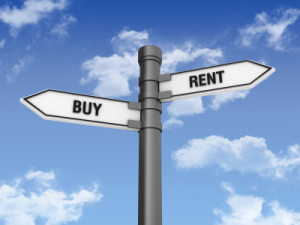 Take
Nila Dulay and her husband, Erick. They owned a home in a beautiful
gated community in Lakeland, FL, complete with a pool, tennis court and
boat dock. But when the couple accepted jobs in the Seattle area in late
2012, they faced serious sticker shock: Seattle’s home value index is currently $465,300 – more than $300,000 above the values in Lakeland.
Take
Nila Dulay and her husband, Erick. They owned a home in a beautiful
gated community in Lakeland, FL, complete with a pool, tennis court and
boat dock. But when the couple accepted jobs in the Seattle area in late
2012, they faced serious sticker shock: Seattle’s home value index is currently $465,300 – more than $300,000 above the values in Lakeland.“The prices of homes were so much higher, we realized we wouldn’t get a nice home for the same money,” said Nila.
So, for $1,600 per month, plus utilities, the couple moved into a rental in Covington, WA, 25 miles south of Seattle. The situation wasn’t ideal, but it made short-term sense for twenty-somethings who just moved across the country.
Finances drove the Dulays’ decision to rent. But there are other factors to consider.
Reasons to rent
- Flexibility. Renting offers an easy way to test an area’s safety, amenities and ease of commute.
- Career uncertainty. If job stability is a concern, renting may be a better option since buying is typically a longer-term commitment.
- Smaller cash outlay. Renting usually requires first and last months’ rent and a security deposit. Buying requires tens of thousands of dollars down.
- Bad credit. Creating a history of on-time rental payments may raise your credit score and help you qualify for a mortgage that may better suit your needs.
- No maintenance. There’s typically no need to worry about repairs – just report the problem to the landlord. Incidentals. Sometimes utilities such as water, sewage or garbage are included in the rent price. Plus, many rental complexes include their own pool and gym.
Reasons to buy
- Equity. This is the difference between the market value of your home and the amount still owed on the mortgage. As you make your mortgage payments and reduce the loan principal, you may increase your equity in your home.
- Tax deductions. You may be able to deduct mortgage interest as well as property taxes from your income taxes. Talk to your tax professional for more information.
- Creative control. Paint your walls bright orange if you want. Rentals rarely allow redecorating or remodeling.
- Maintenance choices. Do it yourself or call your own contractor. An exception is a condo or homeowners association, where you might have maintenance covered.
Figure out your ‘breakeven horizon’
Determining your “breakeven horizon” can help you to better understand the costs involved before you make your decision. This metric, introduced by Zillow, uses market-by-market data to determine the number of years it would take for buying a home to become more financially advantageous than renting the same home.“Given how high rents are and how low home values are in many markets, buying may appear to make financial sense even if you’re only going to be there for a couple years,” says Svenja Gudell, director of economic research for Zillow. “But then you have to consider the emotional stress that goes along with buying a home, moving and adjusting to a new neighborhood. It’s not the sort of stress most people want to deal with every 2 years.”

No comments:
Post a Comment